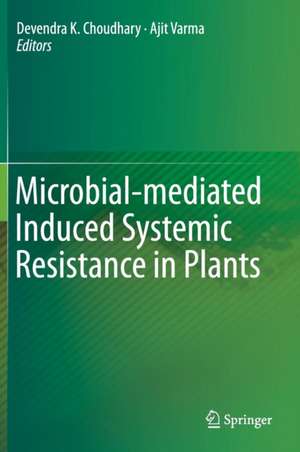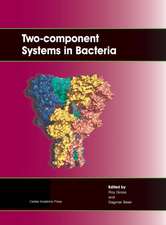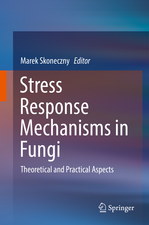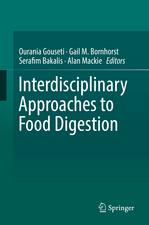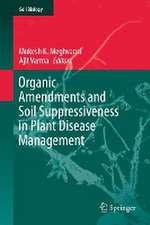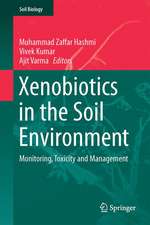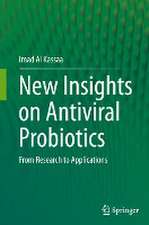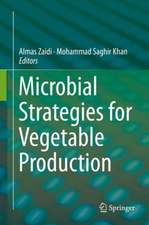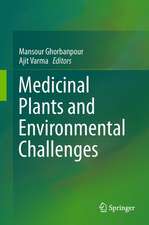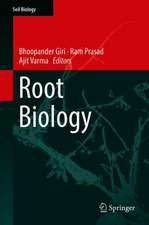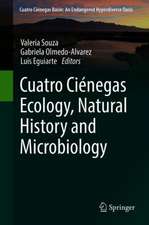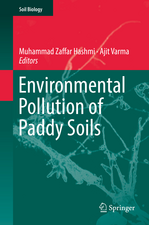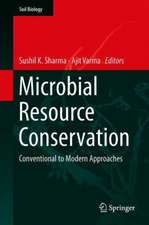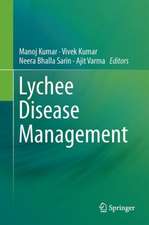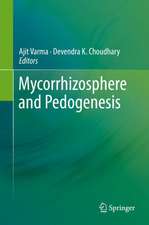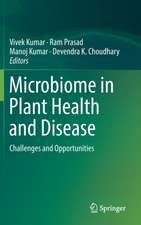Microbial-mediated Induced Systemic Resistance in Plants
Editat de Devendra K. Choudhary, Ajit Varmaen Limba Engleză Hardback – 31 mar 2016
Amongother stresses, habitat-imposed biotic stress is one serious condition causingmajor problems for cropproductivity. Most plants employplant-growth-promoting microorganisms (PGPMs) to combat and protect themselves from stresses and alsofor better growth.
PGPMsare bacteria associated with plant roots and they augment plant productivityand immunity. They arealso defined as root-colonizing bacteria that havebeneficial effects on plant growth and development. Remarkably, PGPMs includingmycorrhizae, rhizobia, and rhizobacteria (Acinetobacter, Agrobacterium,Arthrobacter, Azospirillum, Bacillus, Bradyrhizobium, Frankia, Pseudomonas,Rhizobium, Serratia, Thiobacillus) form associations with plant roots andcan promote plant growth by increasing plants’ access to soil minerals and protecting them against pathogens.
To combat the pathogens causing different diseases and other biotic stresses, PGPMs produce a higher level ofresistance in addition to plants’indigenous immune systems in the form of induced systemic resistance (ISR).
The ISR elicitedby PGPMs has suppressed plant diseases caused by a range of pathogens in boththe greenhouse and field. Assuch, the role of these microbes can no longer be ignored forsustainable agriculture.
Today,PGPMs are also utilized in the form of bio-fertilizers to increase plantproductivity. However, the use of PGPMs requires a precise understanding of the interactions between plants and microbes, betweenmicrobes and microbiota, and how biotic factors influence theserelationships. Consequently, continued research is needed to develop newapproaches to boost theefficiency of PGPMs and to understand the ecological, genetic and biochemicalrelationships in their habitat.
Thebook focuses on recentresearch concerning interactions between PGPMs and plants under biotic stress. It addresses key concernssuch as –
1.The response of benignmicrobes that benefitplants under biotic stress
2.The physiologicalchanges incurred in plants under harsh conditions 3.The role of microbialdeterminants in promotingplant growth under biotic stress
Thebook focuses on a range of aspects related to PGPMs such as their mode of action, primingof plant defence and plant growth in disease challenged crops, multifunctionalbio-fertilizers, PGPM-mediateddisease suppression, andtheeffect of PGPMs on secondary metabolites etc.
Thebook will be a valuableasset to researchers and professionals working in the area ofmicrobial-mediated support ofplants under biotic stress.
| Toate formatele și edițiile | Preț | Express |
|---|---|---|
| Paperback (1) | 944.51 lei 6-8 săpt. | |
| Springer Nature Singapore – 25 apr 2018 | 944.51 lei 6-8 săpt. | |
| Hardback (1) | 952.09 lei 6-8 săpt. | |
| Springer Nature Singapore – 31 mar 2016 | 952.09 lei 6-8 săpt. |
Preț: 952.09 lei
Preț vechi: 1161.08 lei
-18% Nou
Puncte Express: 1428
Preț estimativ în valută:
182.27€ • 190.18$ • 152.79£
182.27€ • 190.18$ • 152.79£
Carte tipărită la comandă
Livrare economică 12-26 martie
Preluare comenzi: 021 569.72.76
Specificații
ISBN-13: 9789811003875
ISBN-10: 9811003874
Pagini: 232
Ilustrații: X, 226 p. 39 illus., 36 illus. in color.
Dimensiuni: 178 x 254 x 14 mm
Greutate: 0.64 kg
Ediția:1st ed. 2016
Editura: Springer Nature Singapore
Colecția Springer
Locul publicării:Singapore, Singapore
ISBN-10: 9811003874
Pagini: 232
Ilustrații: X, 226 p. 39 illus., 36 illus. in color.
Dimensiuni: 178 x 254 x 14 mm
Greutate: 0.64 kg
Ediția:1st ed. 2016
Editura: Springer Nature Singapore
Colecția Springer
Locul publicării:Singapore, Singapore
Public țintă
ResearchCuprins
1. Changes in phytochemicals in response to rhizospheric microorganisms infection
Mehrnaz Hatami, Mansour Ghorbanpour
2. Bacillus-mediated induced systemic resistance (ISR) against Fusarium corm rot
Shanu Magotra, Deepika Trakroo, Sneha Ganjoo and Jyoti Vakhlu
3. Plant growth-promoting rhizobacteria: key mechanisms of action
Márcia do Vale Barreto Figueiredo, Aurenívia Bonifacio, Artenisa Cerqueira Rodrigues, Fabio Fernando de Araujo
4. Priming of plant defense and plant growth in disease challenged crops using microbial consortia
Murugan Kumar, Nanjappan Karthikeyan, and Radha Prasanna
5. Seed priming mediated induced disease resistance in arid zone plants
Rakesh Pathak, Praveen Gehlot and S.K. Singh
6. Trichoderma secondary metabolites: their biochemistry and possible role in disease management
Anita Surendra Patil, Surendra Rajaram Patil and Hariprasad Madhukarrao Paikrao
7. Induced systemic resistance in rice
Kalaivani K. Nadarajah
8. Plant growth promoting rhizobacteria mediated acquired systemic resistance in plants against pests and diseases
S.K. Singh, Rakesh Pathak and Vipin Chaudhary
9. Acyl homoserine lactone producing rhizobacteria-elicit systemic resistance in plants
Ganga Viswanath, Jegan Sekar, and V.R. Prabhavathy
10.Biological Control of chickpea Fusarium wilt using rhizobacteria “PGPR”
Souad Zaim, Lakhdar Belabid, Bassam Bayaa
11. AM fungal effect on the growth of selective dicot and monocot plants
B. Sadhana*, P. K. Monica and S. Siva Sankari
12. Trichoderma spp.: Efficient Inducers of Systemic Resistance in Plants
Kartikay Bisen, Chetan Keswani, J. S. Patel, B. K. Sarma, H. B. Singh
13. Induced systemic resistance by rhizospehric microbes
Manoj Kumar, Priyanku Teotia, Ajit Varma, Narendra Tuteja, and Vivek Kumar
14. Combinations of plant growth-promoting rhizobacteria (PGPR) for initiation of systemic resistance against tree diseases
Vivek Kumar, Ajit Varma Narendra Tuteja and Manoj Kumar
15. Plant growth promoting microbial-mediated induced systemic resistance in plants: induction, mechanism and expression
Shekhar Jain, Ajit Varma, Narendra Tuteja, D.K. Choudhary
Notă biografică
Dr. Devendra K. Choudhary
Dr. Choudhary has over fourteen years of experience in MicrobialEcology and is currentlyworking as an Assistant Professor-Grade III at Amity University, Noida. Before joiningAmity University, Dr. Choudhary spent several years at Mody University, Lakshmangarh, as an Assistant Professor, preceded by work at Peoplesand Barkatullah University, Bhopal as a Lecturer cum scientist.
Dr. Choudhary received his PhD in Microbiology in 2005 from GB PantUniversity of Agriculture & Technology, Pantnagar, after having received his MSc in Microbiologyfrom MDS University, Ajmer and qualifyingCSIR-UGC-NET in 2002.
Dr. Choudhary has worked on GOI sponsoredmajor projects as Principle Investigator (PI). Recently he worked on the DST FAST-TRACK project at the Department ofBiotechnology, Barkatullah University, Bhopal, along with two major projects byDBT and SERB, at AmityUniversity until the year 2015.
As an active researcher, Dr Choudhary has published research and reviewarticles along with several book chapters for reputed journals and edited books.In addition, he has served asPhD supervisor/co-supervisor for several research scholars. Dr Choudhary is a recipient of the Indian National Science Academy (INSA) visitingand summer research fellowship 2014.
Further,one of his PhD studentsreceived the 2013 Dr RSRana Memorial best research award, sponsored by the Association of Microbiologists of India. Under supervision of Dr Choudhary hisscientific team has assigned two accession numbers from MTCC, IMTECH forsubmitted bacterial cultures (MTCC, 12057 & 12058) along with one MCC no2607. Most recently,his team has filed three patents with the India Patent Office, New Delhi and others are in progress.
Prof. Dr. Ajit Varma
Dr. Varma completed his M.Sc. (1959) & Ph.D.(1964) degrees atAllahabad University, Allahabad, India. In the course of his professional career, he hasalso served as a Microbiologist(Assistant Professor), IARI, New Delhi (1963-1971), Senior Microbiologist(Associate Professor), IARI, New Delhi (1971-1974), Associate Professor, JNU,New Delhi (1975-1984), and Professor, JNU, New Delhi (1985-2004). He has been avisiting professor & visiting research scientist at the Technical University, Graz (Austria),University of Tuebingen, Tuebingen (Germany), Friedrich Schiller University,Jena (Germany), Philipps University, Marburg (Germany), Technical University, Munich (Germany), Kingston (Jamaica), Max PlanckVisiting Professorship (Germany), Helmholtz Zentrum, Muenchen (Germany),Gutenberg University, Mainz (Germany), CSIC, Madrid (Spain), University ofDundee (Scotland), University of Ljubljana (Slovenia), and ICGEB (Italy). Hisinternational awards/fellowships include the Commonwealth Fellowship(Australia), National Research Council (Canada), Alexander von HumboldtFoundation (Germany), National Science Foundation (USA), Indo-CzechoslovakiaExchange Programme (Prague), DAAD Fellowship (Germany), and the Deutsches BMFT Programme, George-AugustUniversity, Gottingen (Germany), RAISA.
He was awarded a fellowship for Innovative Research inBiotechnology (Italy), Swiss Federal Research Fellowship (Switzerland), the BP Koirala award (Nepal)and DFG-INSA Fellowship (Indo- Germany), as well as the FAMI Award - Association ofMicrobiologists of India and Honorary Diploma, UMF, Cluj-Napoca, Romania. Dr.Varma has supervised 60 PhD students.He has published over 290 research articles for national and international journals of repute, as well as several majorreview articles and chapters in books. He has published 50 books in the area of Microbial Technology,published by Academic Press, London, CRC Press, Florida, USA, IDRC, Canada andSpringer-Verlag, Germany.
Dr.Varma has been the series editor for Springer-Verlag’sSeries on Soil Biology, andhas edited fifty volumes on Soil Biology. He was also nominated as Editor-in-Chief by IKInternationals to make series of books on Microbial and BiotechnologicalResearch.
Dr. Varma has been a member of the National Academy ofAgriculture Sciences, International Society of Symbiosis, Boston, USA, IndianScience Congress Association, Executive Council, Amity University UttarPradesh, University Research Council, Amity University Uttar Pradesh, AcademicCouncil, Amity University Rajasthan, ASSOCHAM Knowledge Millennium Council,ASSOCHAM Expert Committee on Agriculture and Food Processing, and ASSOCHAM Expert Committeeon S&T and Innovation. He hasvast experience in organizing national and international trainingworkshops/symposia and congresses.
Dr. Choudhary has over fourteen years of experience in MicrobialEcology and is currentlyworking as an Assistant Professor-Grade III at Amity University, Noida. Before joiningAmity University, Dr. Choudhary spent several years at Mody University, Lakshmangarh, as an Assistant Professor, preceded by work at Peoplesand Barkatullah University, Bhopal as a Lecturer cum scientist.
Dr. Choudhary received his PhD in Microbiology in 2005 from GB PantUniversity of Agriculture & Technology, Pantnagar, after having received his MSc in Microbiologyfrom MDS University, Ajmer and qualifyingCSIR-UGC-NET in 2002.
Dr. Choudhary has worked on GOI sponsoredmajor projects as Principle Investigator (PI). Recently he worked on the DST FAST-TRACK project at the Department ofBiotechnology, Barkatullah University, Bhopal, along with two major projects byDBT and SERB, at AmityUniversity until the year 2015.
As an active researcher, Dr Choudhary has published research and reviewarticles along with several book chapters for reputed journals and edited books.In addition, he has served asPhD supervisor/co-supervisor for several research scholars. Dr Choudhary is a recipient of the Indian National Science Academy (INSA) visitingand summer research fellowship 2014.
Further,one of his PhD studentsreceived the 2013 Dr RSRana Memorial best research award, sponsored by the Association of Microbiologists of India. Under supervision of Dr Choudhary hisscientific team has assigned two accession numbers from MTCC, IMTECH forsubmitted bacterial cultures (MTCC, 12057 & 12058) along with one MCC no2607. Most recently,his team has filed three patents with the India Patent Office, New Delhi and others are in progress.
Prof. Dr. Ajit Varma
Dr. Varma completed his M.Sc. (1959) & Ph.D.(1964) degrees atAllahabad University, Allahabad, India. In the course of his professional career, he hasalso served as a Microbiologist(Assistant Professor), IARI, New Delhi (1963-1971), Senior Microbiologist(Associate Professor), IARI, New Delhi (1971-1974), Associate Professor, JNU,New Delhi (1975-1984), and Professor, JNU, New Delhi (1985-2004). He has been avisiting professor & visiting research scientist at the Technical University, Graz (Austria),University of Tuebingen, Tuebingen (Germany), Friedrich Schiller University,Jena (Germany), Philipps University, Marburg (Germany), Technical University, Munich (Germany), Kingston (Jamaica), Max PlanckVisiting Professorship (Germany), Helmholtz Zentrum, Muenchen (Germany),Gutenberg University, Mainz (Germany), CSIC, Madrid (Spain), University ofDundee (Scotland), University of Ljubljana (Slovenia), and ICGEB (Italy). Hisinternational awards/fellowships include the Commonwealth Fellowship(Australia), National Research Council (Canada), Alexander von HumboldtFoundation (Germany), National Science Foundation (USA), Indo-CzechoslovakiaExchange Programme (Prague), DAAD Fellowship (Germany), and the Deutsches BMFT Programme, George-AugustUniversity, Gottingen (Germany), RAISA.
He was awarded a fellowship for Innovative Research inBiotechnology (Italy), Swiss Federal Research Fellowship (Switzerland), the BP Koirala award (Nepal)and DFG-INSA Fellowship (Indo- Germany), as well as the FAMI Award - Association ofMicrobiologists of India and Honorary Diploma, UMF, Cluj-Napoca, Romania. Dr.Varma has supervised 60 PhD students.He has published over 290 research articles for national and international journals of repute, as well as several majorreview articles and chapters in books. He has published 50 books in the area of Microbial Technology,published by Academic Press, London, CRC Press, Florida, USA, IDRC, Canada andSpringer-Verlag, Germany.
Dr.Varma has been the series editor for Springer-Verlag’sSeries on Soil Biology, andhas edited fifty volumes on Soil Biology. He was also nominated as Editor-in-Chief by IKInternationals to make series of books on Microbial and BiotechnologicalResearch.
Dr. Varma has been a member of the National Academy ofAgriculture Sciences, International Society of Symbiosis, Boston, USA, IndianScience Congress Association, Executive Council, Amity University UttarPradesh, University Research Council, Amity University Uttar Pradesh, AcademicCouncil, Amity University Rajasthan, ASSOCHAM Knowledge Millennium Council,ASSOCHAM Expert Committee on Agriculture and Food Processing, and ASSOCHAM Expert Committeeon S&T and Innovation. He hasvast experience in organizing national and international trainingworkshops/symposia and congresses.
Textul de pe ultima copertă
With a focus on food safety, this book highlights the importance of microbes in sustainable agriculture. Plants, sessile organisms that are considered as primary producers in the ecosystem and communicate with above- and below-ground communities that consist of microbes, insects, and other vertebrate and invertebrate animals, are subjected to various kinds of stress. Broadly speaking, these can be subdivided into abiotic and biotic stresses.Plants have evolved to develop elaborate mechanisms for coping with and adapting to the environmental stresses.
Among other stresses, habitat-imposed biotic stress is one serious condition causing major problems for crop productivity. Most plants employ plant-growth-promoting microorganisms (PGPMs) to combat and protect themselves from stresses and also for better growth.
PGPMs are bacteria associated with plant roots and they augment plant productivityand immunity. They are also defined as root-colonizing bacteria that have beneficial effects on plant growth and development. Remarkably, PGPMs including mycorrhizae, rhizobia, and rhizobacteria (Acinetobacter, Agrobacterium, Arthrobacter, Azospirillum, Bacillus, Bradyrhizobium, Frankia, Pseudomonas, Rhizobium, Serratia, Thiobacillus) form associations with plant roots and can promote plant growth by increasing plants’ access to soil mineralsand protecting them against pathogens.
To combat the pathogens causing different diseases and other biotic stresses, PGPMsproduce a higher level of resistance in addition to plants’ indigenous immune systems in the form of induced systemic resistance (ISR).
The ISR elicited by PGPMs has suppressed plant diseases caused by a range of pathogens in both the greenhouse and field. As such, the role of these microbes can no longer be ignored for sustainable agriculture.
Today, PGPMs are also utilized in the form of bio-fertilizers to increase plant productivity. However, the use of PGPMs requires a precise understanding of the interactions between plants and microbes, between microbes and microbiota, and how biotic factors influence these relationships. Consequently, continued research is needed to develop new approaches to boost the efficiency of PGPMs and to understand the ecological, genetic and biochemical relationships in their habitat.
The book focuses on recent research concerning interactions between PGPMs and plants under biotic stress. It addresses key concerns such as –
1. The response of benign microbes that benefit plants under biotic stress
2. The physiological changes incurred in plants under harsh conditions
3. The role of microbial determinants in promoting plant growthunder biotic stress
The book focuses on a range of aspects related to PGPMs such as their mode of action, priming of plant defence and plant growth in disease challenged crops, multifunctional bio-fertilizers, PGPM-mediated disease suppression, and the effect of PGPMs on secondary metabolites etc.
The book will be a valuable asset to researchers and professionals working in the area of microbial-mediated support of plants under biotic stress.
Among other stresses, habitat-imposed biotic stress is one serious condition causing major problems for crop productivity. Most plants employ plant-growth-promoting microorganisms (PGPMs) to combat and protect themselves from stresses and also for better growth.
PGPMs are bacteria associated with plant roots and they augment plant productivityand immunity. They are also defined as root-colonizing bacteria that have beneficial effects on plant growth and development. Remarkably, PGPMs including mycorrhizae, rhizobia, and rhizobacteria (Acinetobacter, Agrobacterium, Arthrobacter, Azospirillum, Bacillus, Bradyrhizobium, Frankia, Pseudomonas, Rhizobium, Serratia, Thiobacillus) form associations with plant roots and can promote plant growth by increasing plants’ access to soil mineralsand protecting them against pathogens.
To combat the pathogens causing different diseases and other biotic stresses, PGPMsproduce a higher level of resistance in addition to plants’ indigenous immune systems in the form of induced systemic resistance (ISR).
The ISR elicited by PGPMs has suppressed plant diseases caused by a range of pathogens in both the greenhouse and field. As such, the role of these microbes can no longer be ignored for sustainable agriculture.
Today, PGPMs are also utilized in the form of bio-fertilizers to increase plant productivity. However, the use of PGPMs requires a precise understanding of the interactions between plants and microbes, between microbes and microbiota, and how biotic factors influence these relationships. Consequently, continued research is needed to develop new approaches to boost the efficiency of PGPMs and to understand the ecological, genetic and biochemical relationships in their habitat.
The book focuses on recent research concerning interactions between PGPMs and plants under biotic stress. It addresses key concerns such as –
1. The response of benign microbes that benefit plants under biotic stress
2. The physiological changes incurred in plants under harsh conditions
3. The role of microbial determinants in promoting plant growthunder biotic stress
The book focuses on a range of aspects related to PGPMs such as their mode of action, priming of plant defence and plant growth in disease challenged crops, multifunctional bio-fertilizers, PGPM-mediated disease suppression, and the effect of PGPMs on secondary metabolites etc.
The book will be a valuable asset to researchers and professionals working in the area of microbial-mediated support of plants under biotic stress.
Caracteristici
Comprehensive account of plant microbe interaction and their response to systemic and induced resistance Elucidates self explanatory illustrations for transporter-mediated microbe-plant interactions Emphasizes biotechnological perspectives of microbes in sustainable agriculture Demonstrates role of microbes in food security
